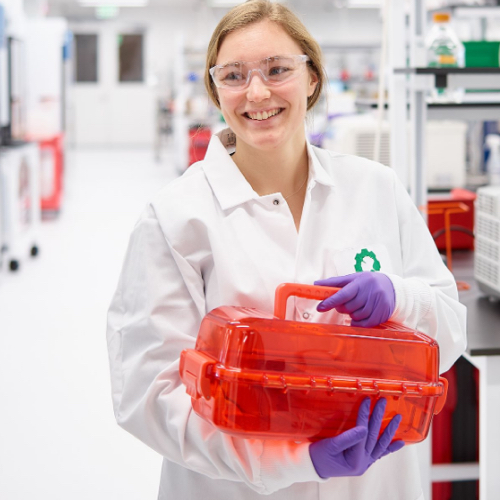Ginkgo Bioworks’ cell engineering platform lowers the bar for entry into developing products through metabolic engineering.
High-throughput strain design and testing on industry-leading chassis strains, paired with AI-enhanced enzyme engineering tools provides Ginkgo’s partners rapid prototyping and development. Nádia Parachin, Senior Director of Business Development at Ginkgo discusses how this streamlined process enables quicker market entry, fostering a lower barrier to bringing new products to market.
Humans of Ginkgo Bioworks is an interview series featuring Sudeep Agarwala interviewing some of the brilliant folks at Ginkgo to learn more about the technology that makes our work possible.
Sudeep Agarwala: You’ve run projects for quite some time at Ginkgo, but before that, were spanning both academia and industry, correct?
Nádia Parachin: Well I’ve been at Ginkgo for almost four years now, but you’re right–I came to Ginkgo from Brazil. In Brazil, I was a professor at Universidade de Brasilia and at the same time, I was the Co-Founder and CEO of Integra Bioprocessors. Integra used metabolic engineering to convert agro-residues (glycerol, for example) into high-value chemicals. And in fact, two of the technologies that we co-developed at Integra and UnB was a microbial strain producing PLA from glycerol and another strain producing Hyaluronic acid from sugar.
But that also naturally led to this position at Ginkgo. Since 2020, I have run quite a few projects at Ginkgo through the Foundry in yeast–Saccharomyces cerevisiae. What can I say? It’s my favorite yeast.
SA: Recently you’ve made an interesting shift–you’ve moved over to the commercial side, thinking about how Ginkgo’s platform can be applied widely to different companies?
NP: What is most impressive to see at Ginkgo during these years is not only once but–to my knowledge–at least a few times, the production of molecules that have never been made in a microbial host before. I’ve seen the same for enzymatic reactions. At Ginkgo, we demonstrated reactions not found in nature, truly contributing to the company’s mission of making biology easier to engineer.
The reason for these success stories is the combination of our physical platform–automated, high-throughput strain design, construction, and testing– paired with our digital assets– incredible database of enzyme engineering experimental results and now AI-enabled engineering tools. An equal player in this is the expertise of the people who run these workflows and design the experiments at Ginkgo. We have a collection of people who have deep knowledge of the different microbial hosts and have been working for years on critical pathways and developing tools to make this engineering possible.
What I find exciting about being on the commercial team is that my team’s technical expertise can be teamed up with people who have a real understanding of the market, resulting in tailor-made offers for what the market demands. It has been a fun journey, and I’m thrilled to be part of this team.
SA: Maybe to go into more detail here, what exactly does Ginkgo provide to its partners?
NP: Ginkgo provides our partners with a head start–partially because of the platform and our knowledge-base–technical assets we’ve collected over the years. So if a partner comes to us and wants to make an innovation in their field, they don’t have to invest in their own lab space, expensive specialized equipment, etc. They can get started very quickly by leveraging Ginkgo’s R&D capabilities and running experiments for a fraction of the cost of building a lab from scratch. This means they have a lower barrier to explore which product has the potential to make a real difference in the market.
We’re also providing value to the companies already in the field, who are already doing synthetic biology and fermentation. These companies know what they are doing in terms of their technology, their market. They have a good understanding of their processes for commercialization. But with our expertise, we can take on newer, earlier-stage projects instead of these companies having to rearrange their internal R&D: let us do your innovation, and when the technology is mature, you can incorporate it into your pipeline–you do the manufacturing and the commercialization.
SA: I’m curious about the difference between Ginkgo and CROs. When does it make sense to come to Ginkgo vs. say, going to a CRO?
NP: We see this question come up all the time. The most important difference is that besides our platform and a proprietary database, Ginkgo has developed and owns what we call “chassis” strains: microbial hosts that have been modified for increasing flux throughout key metabolic pathways.
Take the shikimate pathway, for example. This pathway can produce multiple molecules, ranging from building blocks for polymer production to flavors, fragrances, and nutraceuticals.
When you go to a CRO to engineer a product off the shikimate pathway, you have to start from scratch to develop dedicated enzymes for your target’s pathway. In parallel, you also have to develop a strain that will have a high flux through the shikimate pathway to get your product to your target titers.
But when you’re working with Ginkgo, our starting point is lightyears ahead. We’ve already developed the base assets, our ‘chassis’ strains that have flux through the shikimate pathway at very high levels. So now we dedicate our work to the specific part of our customer’s pathway that converts this flux into their target molecule. And because it’s only this part, we can deliver both prototyping and strain development faster than any other CRO.
I’m talking about the shikimate pathway here, but it also applies towards fatty acid metabolism, terpenes, any range of pathways that you’re engineering off of. You’re not starting from scratch–you have the starting strain, the platform, the enzyme engineering capabilities, and that gives you a head start towards commercialization.
SA: So this is a compelling reason for leveraging Ginkgo’s platform, but I’m curious what happens if too many people start to do that. Like you’ve acknowledged, there’s a big market in metabolic engineering for small molecules. How does Ginkgo think about protecting information between different companies who are coming to Ginkgo?
NP: This has come up a few times as a major concern from people who are talking to us. We’ve had partners who have said “Look, I know you guys have a project with my competition. Can you guarantee that there’s not going to be any sharing of my information?”
And one of my arguments for the companies in industrial biology has been that we aren’t just doing small molecules: we have pharmaceutical companies on the platform–that’s the standard that we’re working with to ensure that there’s no sharing of information between different projects for different companies. We have that capability and we take it very seriously. We’ve developed systems internally that flag information so that it cannot be shared and that data that results from one customer’s project cannot be shared.
The entire point is that Ginkgo prepared itself over the years to be positioned at the cutting-edge of synthetic biology technology, and we’re working towards utilizing the platform to enable the sustainable production of biomolecules applied to several industrial sectors. It’s not just about engineering strains, it’s also about creating a bioeconomy and seeing it thrive. And we’ve made it possible so people can develop their strains and bring their products to market with confidence that they’ll be competitive.
 Nádia Skorupa Parachin, Ph.D., is Senior Director of business Development at Ginkgo Bioworks, leading the Industrial Biotechnology sales team for the production of small molecules. Nádia brings over 15 years of experience in synthetic biology, metabolic engineering, and project management. She has previously served on the technical team at Ginkgo as a Senior Program Lead, engineering and delivering custom strains for Ginkgo’s partners. Before joining Ginkgo Bioworks, she was CEO of Integra Bioprocessors and a professor of biotechnology at Universidade de Brasilia (UnB).
Nádia Skorupa Parachin, Ph.D., is Senior Director of business Development at Ginkgo Bioworks, leading the Industrial Biotechnology sales team for the production of small molecules. Nádia brings over 15 years of experience in synthetic biology, metabolic engineering, and project management. She has previously served on the technical team at Ginkgo as a Senior Program Lead, engineering and delivering custom strains for Ginkgo’s partners. Before joining Ginkgo Bioworks, she was CEO of Integra Bioprocessors and a professor of biotechnology at Universidade de Brasilia (UnB).
 Nádia Skorupa Parachin, Ph.D., is Senior Director of business Development at Ginkgo Bioworks, leading the Industrial Biotechnology sales team for the production of small molecules. Nádia brings over 15 years of experience in synthetic biology, metabolic engineering, and project management. She has previously served on the technical team at Ginkgo as a Senior Program Lead, engineering and delivering custom strains for Ginkgo’s partners. Before joining Ginkgo Bioworks, she was CEO of Integra Bioprocessors and a professor of biotechnology at Universidade de Brasilia (UnB).
Nádia Skorupa Parachin, Ph.D., is Senior Director of business Development at Ginkgo Bioworks, leading the Industrial Biotechnology sales team for the production of small molecules. Nádia brings over 15 years of experience in synthetic biology, metabolic engineering, and project management. She has previously served on the technical team at Ginkgo as a Senior Program Lead, engineering and delivering custom strains for Ginkgo’s partners. Before joining Ginkgo Bioworks, she was CEO of Integra Bioprocessors and a professor of biotechnology at Universidade de Brasilia (UnB).
